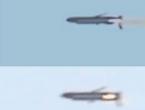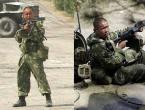Who stopped the column of the Georgian army. How a "military Buryat" Bato Dashidorzhiev stopped a column of Georgian special forces. “Still, he is Russian, is such admiration necessary?”
In the history of confrontation between Russia and the United States, there have been cases when the world stood on the brink of a global conflict. The authors of the special report talk about little-known details that have become iconic in history.
Yugoslavia, 1999
The column of NATO tanks was stopped by one person - Alexei Dagadin, a resident of the Kursk region.
A NATO mechanized column with tanks at the head was approaching the location of the Russian paratroopers. Ours noticed them:
- Platoon, to battle! Pindos have arrived!
- Ready to fight!
- Ready to fight!
- Ready to fight! - was heard in response from the paratroopers-colleagues who took up arms.
- Zero-three sight on the lead tank!
Taking a grenade launcher, a Russian soldier stood up to his full height and directed it at the tank going first, and this gloomy English tank stopped.
Nearby, 200 Russian paratroopers stood shoulder to shoulder with weapons.
This episode was included in many military textbooks, and in particular, it is described how the commander of the Russian landing force climbs onto the armor of the lead tank, taps on it with his bayonet and orders menacingly: “There is no way forward! Understandably?" and will show with a gesture of crossing his arms "Stop" (No move)
The American commander of the NATO division will give the order to open fire, but the English tank general will declare that he will not arrange the Third World War and will refuse to obey the order of the American.
- Sir, I see a man in military uniform with a grenade launcher in his hands.
- What is he doing?
- He is on the road, blocking our way, do not pass, sir! And it's Russian! Russian soldier!
- Listen carefully: shoot to kill! The Russians must be destroyed!
From America they will start calling the Kremlin, from the Kremlin to the White House, the diplomats will go crazy, and the military will jerk their shutters, but the NATO tanks will not budge.
***
Alexey Dagadin:
This episode will be studied in history as the birth of a new Russia, because even if we could not do anything for the Serbs, everything was done right in this episode. We have shown that Russia is a great country
***
From the memoirs of an English general: “There were only 200 Russians, and we have an order to capture the airport at any cost, even if we have to destroy them. But I saw their determination to fight to the end. And I would not want to be the person who will unleash the "Third World War" And the NATO decided not to attack, but to encircle the Russians
The moral of the whole - 200 brave soldiers stood against the whole army, against tanks, further hunger and cold. BUT they fulfilled their duty to the end, did not retreat, did not give up.
Glory to the fearless Russian soldier.
After the defeat of the Georgian army, its retreating units regrouped and decided to return to Gori, but stumbled upon a Russian checkpoint. The photo shows how a soldier of the Russian Armed Forces, at the ready with a machine gun, confronts the motorized infantry of the Georgian Armed Forces. The officers of the column threatened the machine gunner to get out of the way and let them through, to which they heard in response “Go away .. yb ... t”. Then the media, who were moving with the convoy, tried to talk to the machine gunner, to which they received the same answer. As a result, the column turned around and moved back to where it came from.
The name of the hero of this photo is Bato Dashidorzhiev.
I would watch a documentary film and read an article about this person.
Not enough people...
The same Bato Dashidorzhiev. He died in August 2008 in South Ossetia. Bright memory.

“Once Diogenes went out into the square and shouted: “Hey, people, people!”; But when the people ran, Diogenes attacked him with a stick, saying: “I called people, not scoundrels.”
The kingdom of heaven is yours, brother!
Let the feats of arms of yours and other Russian soldiers not be forgotten by ordinary people, and not be devalued by Russian politicians. Rest in peace to you...

People who are in the subject can see that the fighter’s machine gun is the Pecheneg PKP. In 2008, this quite confidently indicates that before us is a fighter of the Special Forces of the GRU General Staff. It is not a fact that he would be in the lists of dead soldiers ...
Georgia 08.08.08
This is the famous photo. Georgia, 08.08.08
After the defeat of the Georgian army, its retreating units regrouped and decided to return to Gori, but stumbled upon a Russian checkpoint. The photograph shows how a soldier of the Russian Armed Forces, ready with a machine gun, confronts the motorized infantry of the Georgian Armed Forces, the officers of the column threatened the machine gunner to move out of the way and let them through, to which they heard in response “Go ahead .. yb ... t”.
Then the media, who were moving with the convoy, tried to talk to the machine gunner, and received the same answer.
As a result, the column turned around and moved back to where it came from.
What was this soldier thinking? What did he feel at that moment? Wasn't he scared? Surely it was. Or did he not dream of having children and grandchildren, and living a long and happy life? Of course I wanted to. Do you imagine a NATO soldier standing like this with a machine gun in front of an enemy column? Me not. They value their lives too much. Then what's wrong with us? Why are we Russians different? And why do foreigners consider us crazy and unpredictable people?
Pictures from other places visited by our soldiers instantly ran before my eyes.
Here is the Slatina airport, the famous throw of our paratroopers to Pristina, to help our Serb brothers. 200 Russian paratroopers against NATO soldiers. How did they feel, standing face to face with superior enemy forces? I'm sure - the same as our soldier in Georgia. Donbass, Novorossiya. year 2014. Alexander Scriabin died like a hero, throwing grenades under a tank. Alexander was 54 years old, he worked at the Talovskaya mine as a mining rigger. The deceased is survived by his wife and two daughters.
Did his feelings differ from those experienced by Alexander Matrosov, closing the embrasure of the German bunker with his body? It is not at all a matter of fearlessness or a disregard for the most precious thing that we have - our own life. Then what? I started looking for an answer. Is there still a people who would so desperately love life and everything connected with it? We live with an open mind, with a hussar scale. We invite gypsies and bears to the wedding. It is we who are able to arrange a holiday with the last money, generously feed all the guests, and wake up in the morning without a penny in our pocket. We know how to live as if every day in our life is the last. And there will be no tomorrow. There is only now. All our poems and songs are literally permeated through with love for life, but only we know how to listen to them and sob uncontrollably.
Only our people have sayings: “To love is like a queen, to steal is like a million”, “Who does not take risks does not drink champagne”. This is from the desire to drink this life to the bottom, to experience everything that can be done in it. Then why are we Russians, standing and looking into the eyes of the enemy, able to part with this life so easily? This is embedded in our genetic code and originates from the very times when the first aggressor set foot on our Russian land.
It has always been so. At all times. Only chain mail and helmets have changed, spears have been replaced by machine guns. We got tanks and we learned to fly. But the code remains the same. And it always works in us when our house is going to be destroyed or captured. And he does not give us rest if the weak are offended. How it works? Anxious music begins to sound in us, which only we hear. This code sounds like a bell in us until the uninvited guests are thrown out of our land.
And this is where the most important thing happens. A warrior wakes up in each of us. In everyone, from small to large. And it binds us with an invisible thread. And foreigners do not understand this. To do this, you need to BE Russian. BORN them. When our land is in danger, or someone is offended somewhere on earth, be it in Angola, Vietnam or Ossetia, our snipers become the most accurate, tankers - fireproof. The pilots turn into aces and remember such incredible things as a corkscrew and a ram. Our scouts work wonders, sailors become unsinkable, and infantry resemble tenacious tin soldiers. And every Russian, without exception, becomes a defender. Even deep old people and small children.
Remember the grandfather from Novorossia, who fed the enemy with a jar of honey filled with explosives. This is a real story. And we have such warriors - a whole country!
Therefore, those who are going to attack the Russians and expect to see kneeling Russians on Russian soil, with loaves and flowers, will have to be very disappointed. They will see a completely different picture. And I don't think they'll like it.
They are destined to see our grandfathers, fathers, husbands and brothers. Behind them will be mothers, wives and daughters. And behind them will stand the heroes of Afghanistan and Chechnya, soldiers of the Second World War and the First World War, participants in the Battle of Kulikovo and the Battle of the Ice.
Because we are Russians... God is with us!
Photo: Obelisk at the site of the last battle of Nikolai Sirotinin on July 17, 1941. Nearby, on a pedestal, a real 76-mm gun was hoisted - Sirotinin fired at enemies from a similar gun
In July 1941, the Red Army retreated with fighting. In the Krichev area (Mogilev region), the 4th Panzer Division of Heinz Guderian advanced deep into Soviet territory, and the 6th Rifle Division opposed it.
On July 10, an artillery battery of a rifle division entered the village of Sokolnichi, located three kilometers from Krichev. One of the guns was commanded by 20-year-old senior sergeant Nikolai Sirotinin.
In anticipation of the onset of the enemy, the fighters whiled away the time in the village. Sirotinin with the fighters settled in the house of Anastasia Grabskaya.
And one warrior in the field
The approaching cannonade, coming from the direction of Mogilev, and the columns of refugees marching east along the Warsaw highway, indicated that the enemy was approaching.
It is not entirely clear why senior sergeant Nikolai Sirotinin remained alone at his gun during the battle. According to one version, he volunteered to cover the retreat of fellow soldiers across the Sozh River. But it is reliably known that he equipped a position for a cannon on the outskirts of the village so that the road through the bridge could be shot through.
The 76 mm gun was well camouflaged in the tall rye. On July 17, a convoy of enemy vehicles appeared on the 476th kilometer of the Warsaw highway. Sirotinin opened fire. This is how this battle was described by the employees of the archive of the USSR Ministry of Defense (T. Stepanchuk and N. Tereshchenko) in the Ogonyok magazine for 1958.
- Ahead is an armored personnel carrier, behind it are trucks full of soldiers. The camouflaged cannon hit the column. An armored personnel carrier burst into flames, several crumpled trucks fell into ditches. Several armored personnel carriers and a tank crawled out of the forest. Nikolai knocked out a tank. Trying to get around the tank, two armored personnel carriers got bogged down in a swamp ... Nikolai himself brought ammunition, directed, loaded and prudently sent shells into the thick of enemies.

Finally, the Nazis discovered where the fire was coming from, and brought down all their might on a lone gun. Nikolai died. When the Nazis saw that only one person was fighting, they were stunned. Shocked by the bravery of the warrior, the Nazis buried the soldier.
Before lowering the body into the grave, they searched Sirotinin and found a medallion in his pocket, and in it a note with his name and place of residence written. This fact became known after the archive staff went to the battlefield and conducted a survey of local residents. Local resident Olga Verzhbitskaya knew German and on the day of the battle, on the orders of the Germans, she translated what was written on a piece of paper enclosed in a medallion. Thanks to her (and 17 years have passed since the battle at that time), we managed to find out the name of the hero.
Verzhbitskaya reported the name and surname of the soldier, as well as the fact that he lived in the city of Orel.
It should be noted that the employees of the Moscow archive arrived in the Belarusian village thanks to a letter addressed to them from the local historian Mikhail Melnikov. He wrote that in the village he heard about the feat of an artilleryman who fought alone against the Nazis, which amazed the enemy.
Further investigation led historians to the city of Orel, where in 1958 they managed to meet the parents of Nikolai Sirotinin. So the details of the short life of the boy became known.
He was drafted into the army on October 5, 1940 from the Tekmash plant, where he worked as a turner. He began his service in the 55th Infantry Regiment of the Belarusian city of Polotsk. Among five children, Nikolai was the second oldest.
“Affectionate, hard-working, he helped to nurse the younger ones,” his mother Elena Korneevna said about him.
So, thanks to the local historian and the not indifferent employees of the Moscow archive in the USSR, it became known about the feat of the hero-artilleryman. It was obvious that he delayed the advance of the enemy column and inflicted losses on him. That's just specific information about the number of dead Nazis was not known.
Later there were reports that 11 tanks, 6 armored personnel carriers and 57 enemy soldiers were destroyed. According to one version, some of them were destroyed with the help of artillery fired from across the river.
But be that as it may, the feat of Sirotinin is not measured by the number of tanks he knocked out. One, three or eleven... In this case it doesn't matter. The main thing is that the brave guy from Orel fought alone against the German armada, forcing the enemy to suffer losses and tremble with fear.
He could have run, taken refuge in the village, or chosen another path, but he fought to the last drop of his blood. The story of the feat of Nikolai Sirotinin was continued a few years after the article in Ogonyok.
“Still, he is Russian, is such admiration necessary?”
In January 1960, Literaturnaya Gazeta published an article entitled "This is not a legend." Local historian Mikhail Melnikov became one of its authors. It was reported there that Oberleutnant Friedrich Henfeld was an eyewitness to the battle on July 17, 1941. His diary was found after Henfeld's death in 1942. Entries from the diary of the chief lieutenant in 1942 were made by military journalist F. Selivanov. Here is a quote from Henfeld's diary:
July 17, 1941. Sokolnichi, near Krichev. In the evening they buried an unknown Russian soldier. He alone stood at the cannon, shot a column of tanks and infantry for a long time, and died. Everyone was surprised at his courage... Oberst (Colonel) before the grave said that if all the Fuhrer's soldiers fought like this Russian, they would conquer the whole world. Three times they fired volleys from rifles. After all, he is Russian, is such admiration necessary?
And here are the memories recorded in the 60s according to Verzhbitskaya:
- In the afternoon, the Germans gathered at the place where the gun stood. We, the locals, were also forced to come there, - recalls Verzhbitskaya. - To me, as knowing German, the chief German with orders ordered to translate. He said that this is how a soldier should defend his homeland - Fatherland. Then, from the pocket of our killed soldier's tunic, they took out a medallion with a note about who and where. The chief German told me: “Take it and write to your relatives. Let a mother know what a hero her son was and how he died.” I was afraid to do it... Then, standing in the grave and covering Sirotinin's body with a Soviet raincoat, a young German officer tore out a piece of paper and a medallion from me and said something rudely. For a long time after the funeral, the Nazis stood at the cannon and the grave in the middle of the collective farm field, not without admiration, counting the shots and hits.
Later, a bowler hat was found at the battle site, on which it was scratched: "Orphans ...".
In 1948, the remains of the hero were reburied in a mass grave. After the general public learned about the feat of Sirotinin, he was posthumously, in 1960, awarded the Order of the Patriotic War of the 1st degree. And a year later, in 1961, an obelisk was erected at the site of the battle, the inscription on which reports the battle on July 17, 1941. Nearby, a real 76-millimeter gun was hoisted on a pedestal. From a similar gun fired at the enemies of Sirotinin.
Unfortunately, not a single photograph of Nikolai Sirotinin has been preserved. There is only a pencil drawing made by his colleague in the 1990s. But the main thing is that the memory of the brave and fearless boy from Orel, who detained the German convoy of equipment and died in an unequal battle, will remain to the descendants.
Andrey Osmolovsky




